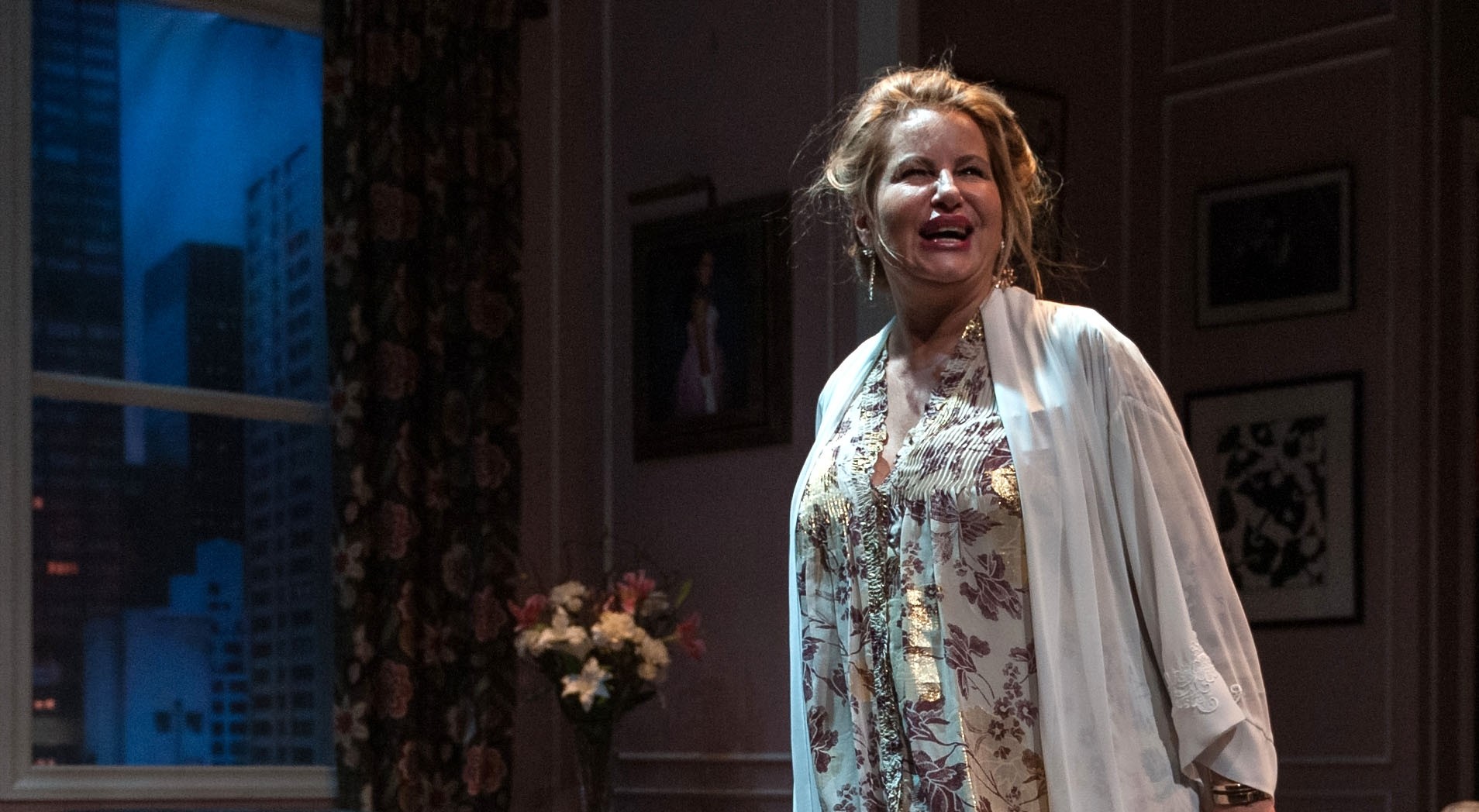It may not be coincidence that the dominant character in Marisa Smith’s hilarious Saving Kitty is named Kate. Guess Who’s Coming To Dinner?, the 1968 Kate Hepburn movie, is not just an antecedent of Saving Kitty, it’s even mentioned in act one. The crucial difference here is that it’s the current decade, not the ‘60s, and instead of a liberal couple upset about their daughter’s engagement to an African-American, Saving Kitty concerns an urbane Manhattan couple, both atheists, whose daughter is engaged to a Evangelical born-again Christian. The other big difference is that, unlike the Hepburn movie, Saving Kitty is extraordinarily funny.
Saving Kitty, a Nora Theatre production cleverly directed by Lee Mikeska Gardner, runs through August 2 at the Central Square. It stars Jennifer Coolidge, the notable character-actress from TV and movies (Legally Blonde and American Pie, the Christopher Guest satires). She often plays an irrepressible, unfiltered ditz, and the juicy part of Kate Hartley is perfect for her: a daffy, strangely insightful blonde.
At first Saving Kitty seems like a smart yet programmatic satire. Kate Hartley is married to United Nations bureaucrat Huntley Hartley. He’s calm and collected, she’s outrageous and outsized; they’re both 50ish, and they both appreciate fine wine, though she’s apt to parody a connoisseur’s lingo (“I detect a hint of pencil lead.”)
Though its off-stage, the guest-room is a place of prime importance in the plot of Saving Kitty. Early on, Kate complains that Huntley has lately “annexed it” as his own, a barely veiled complaint that the sex has gone out of their marriage. Later, the room is a bone-of-contention when it is revealed that daughter Kitty and her evangelical fiancé, Paul, have never had sex … due to Paul’s religious zeal.
Ultimately, Kitty becomes more than a social commentary: it explores both cross-cultural prejudices and intimate emotional lives. Alexander Cook plays Huntley Hartley with centered aplomb. Lewis D. Wheeler finesses the difficult part of Paul, the smart, often frustrated evangelical. He manages to be likable even as much of the liberal Cambridge audience no-doubt hopes he won’t win Kitty’s hand.
Daughter Kitty is a baffling character, largely because Lydia Barnett-Mulligan is miscast. She doesn’t seem believable, physically or temperamentally, as the daughter of these two formidable people. We know from the script that she’s 27 years old, never married, and on her fourth engagement; yet she doesn’t add up as a woman who would lead such a wacky private life. She also doesn’t seem like a top TV news producer. The actress is a sprightly, graceful presence, and she ably expresses real emotional pain when sexually rejected. Yet as the titular Kitty, she’s too lightweight.
Luckily, the focus is more on Coolidge’s Kate and Wheeler’s Paul, and when they’re one-on-one, you can practically smell the gunpowder coming off Kate’s arsenal of weapons. (At one point she tries to scare Paul off by playfully alluding to her daughter’s high-school lesbian love-affair and her collegiate drunken frat-house antics. This is a mother who is stricken with grief to discover her daughter isn’t having sex and no longer drinks alcohol.)
The one-on-one scenes are better paced than the groups scenes, but as the run goes on, this play, already hilarious, will only get stronger. Give yourself the gift of laughter and go.

Leave a Reply
You must be logged in to post a comment.